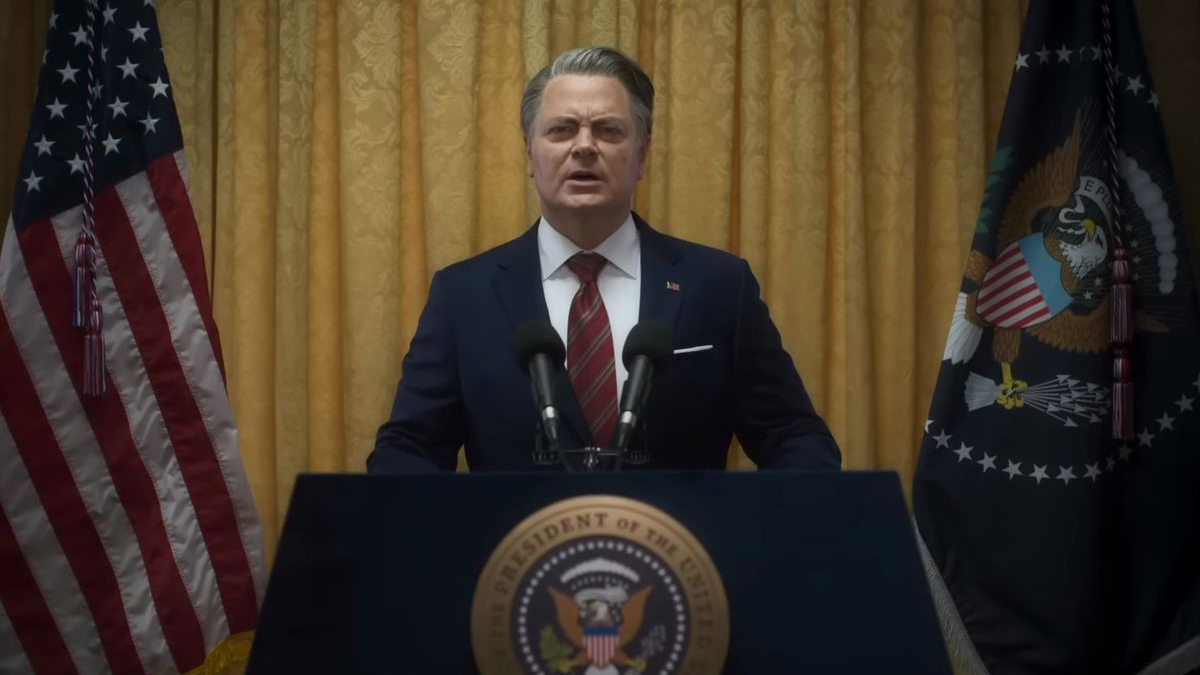Civil War is the sort of movie that people are going to read a lot into, especially right now that we've got another election year underway with Donald Trump attempting to regain the power he lost during the 2020 election. Due to that, a lot of folks are going into this movie thinking they already know what it is and what it's trying to say, and they're going to come out of it thinking it says little and means less. That's because, while Civil War certainly is a movie about Trump and his impact on the United States, writer/director Alex Garland isn't the sort of filmmaker who's going to make it that easy for you.
Civil War opens by focusing on the unnamed president of the United States, played by Nick Offerman, as he's rehearsing lines from a speech, claiming that his government is close to quashing the secessionist revolt by a pair of major factions. He drops a major Trumpism during this bit, saying that people are already calling his victory the greatest triumph in the history of military campaigns.
It doesn't take long for the film to establish how full of crap this guy is--secessionist military forces are staging in Charlottesville, Virginia, preparing to move on Washington and end the war. And we experience the war's final days through the eyes of a group of war correspondents (Kirsten Dunst, Wagner Moura, Stephen McKinley Henderson) and a young tagalong (Cailee Spaeny) who are trying to get from New York City to Charlottesville before it all goes down. It's not normally a long trip, but they need to do a wide loop around Washington because of everything that's happening.
We spend the entire movie on this journey with these folks, never going beyond their perspective. This ride through a war-torn USA is very similar in vibe and structure to Alfonso Cuarón's Children of Men. Garland's version isn't quite so slickly made--but there's no shame in that, since Cuarón doesn't have a lot of peers as a craftsman. Even so, the experience of this movie is tense and thrilling, and Garland's insistence on keeping the perspective on this small group ramps that tension up to 11, especially when the action starts--this way of doing things makes Civil War's relatively small budget feel a lot bigger than it is, especially late in the film.

As this group makes their road trip, they drive through a series of vignettes. They camp out on the other side of a hill near a running gun battle and tag along with one of the sides the next morning to see the conclusion of the fight up close. There's a surprisingly clean and peaceful town that's trying to ignore the war entirely, while stationing men with guns on the roofs of buildings. There's the small-town gas station where the proprietors have "looters" strung up alive in a big container out back--a hardened and stone-faced Dunst, giving the best performance of her career, gets a striking photo of one of their captors standing between the brutalized captives. The main characters even wind up driving through a long-range sniper battle at one point. And through it all, these journalists obsessively document everything while literally standing in formation with soldiers during battles--yep, that's a metaphor.
What's particularly interesting about all of these encounters is that the "sides" are irrelevant most of the way. We see lots of fighting, but until the third act, the movie intentionally obscures who's who. Folks are fighting to not die, rather than to "win," and everything is just chaos--the particulars of the chaos aren't important at this point, after presumably years and years of war.
I say "presumably" because the only backstories we get in Civil War come from our main characters--we don't learn anything specific about how this war began or what's gone down during the war. We're just here, watching these characters experience the brutal end of it. And that experience is the point of the movie, with personal politics not mattering so much. There will be folks who think Civil War is dropping a heavy dose of "both sides-ism" with that, but that ignores that there's a clear villain here: the unnamed Trump-ian president of the United States.
President Nick Offerman is barely in the movie, but it's made clear that the prevailing thought is that this whole war is his fault--the only overtly political sentiments anyone in this film really express are about how much they hate that guy for causing all this death and destruction. It'll take me another viewing or two to drill much deeper on Civil War's themes, since Garland is nuanced and literary as a writer, but this point seems clear to me. As is usually the case, the boss is the one responsible for our pain and misery. But this story is about us, not the boss.
Beyond that, Civil War will work best as an experiential thing, like an atrocity-filled theme park ride that's a bit more dense than your average Purge flick while still hitting some of the same sweet spots that those movies did. It's so effective as an experience that I was able to brush off a climactic contrivance that would have seriously annoyed me in any other movie. And I can't help but love a movie that pulls me in that hard. At least for now.